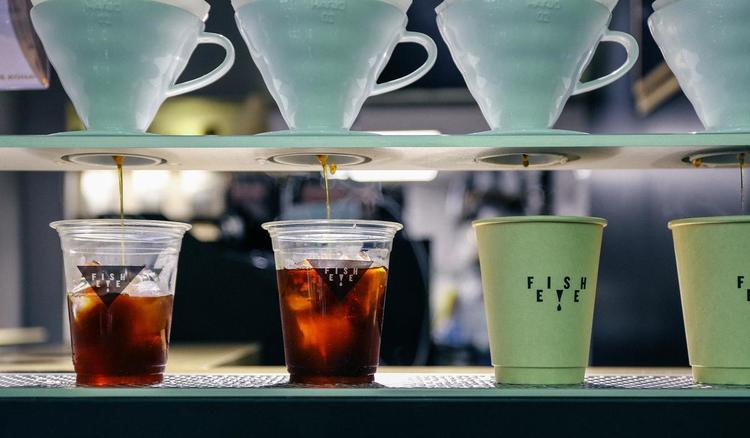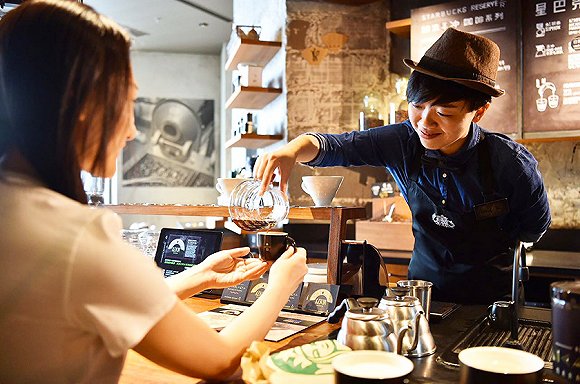[Fish Eye] fisheye Coffee: another coffee shop in Shanghai is ready to open a chain of coffee shops.
Professional barista communication, please pay attention to coffee workshop (Weixin Official Accounts cafe_style)
A new coffee shop opened on the edge of a lane on changle road in shanghai.
Its storefront is small, sandwiched between a hot mutton and clothing store, and a machine tirelessly pumps hot water around the coffee pot. If you walk faster, you're likely to miss the Fish Eye sign.

The country's most coffee-loving city had 5567 cafes by the end of 2016, more than 2200 more than Beijing in second place and three times as many as Guangzhou in third place.
It's not unusual to have one more store like this. One of the reasons why Fisheye caught attention was that it moved out a hand-brewed coffee robot called Poursteady, designed by the former NASA team.

Fisheye founder Sun Yu discovered the machine in a coffee project two years ago and spent more than 100,000 yuan to buy it after the project.
Poursteady was unveiled as a novelty at the 2013 World Developers Conference. Its unique geek aura, coupled with aesthetic fatigue over Clover, Steampunk or BKON coffee machines, has attracted a lot of interest from manufacturers and startups. Amazon and Facebook have coffee machines at their headquarters.
Compared with the traditional hand-punching method, its production is more efficient and the quality is more stable.
The 15-minute waiting time for a cup of hand-brewed coffee can be reduced by half or even a third after the brewing path is calculated. The robot's efficiency is even more evident in its walking: it can brew five cups at a time and can make up to 60 cups in an hour.
Poursteady is hand-built and assembled in Brooklyn, which is difficult to mass produce. Technically speaking, this so-called automatic hand-brewed robot coffee machine is more like a "flushing machine." It relies on a series of actions by the barista to complete a cup of coffee: grinding beans, placing coffee powder on filter paper... so it doesn't reduce labor costs. In a 20-square-meter fisheye coffee, two to three baristas are still needed on weekdays.
"We've done blind tests several times. When the hand-brewed master brewed 5 cups in a row, his performance might be comparable to that of a robot. But when you make 30 cups each, more than 70% of people will choose the machine,"Sun Yu said." People will get tired."

And it certainly caught the attention of consumers and other cafe owners. Seesaw founder Zong Xinkuang went to Fisheye three times in a row shortly after it opened, Sun said.
But given that it does "after 30 cups" standardization, that means fisheye sales have to reach a certain size for Poursteady's benefits to materialize. Making such an investment isn't cost-effective for small cafes--not all can afford a $15000 flush machine.
Fisheye Coffee, the predecessor of Fisheye Coffee, was opened in Beijing in 2010 by Sun Yu and Lei Yiqin, another founder. Sun Yu is responsible for business strategy and brand promotion. Lei Yiqin, who has been a judge of WBC World Barista Competition in China for many times, serves as "Chief Coffee Officer"(CCO), responsible for everything related to coffee roasting, coffee technical training and menu production. At its peak, it had five stores in Beijing (three), Chengdu and Shenyang.
But in 2015, Sun Yu closed all stores. As with most boutique cafes, fisheye's limited customer base can't support the cost of skyrocketing rents.
So before opening Fisheye Coffee, Sun Yu retained some industry fame and a roasting factory in Shenyang. During the period of operating "fish eye", the retail and wholesale of coffee beans from roasting factories contributed a lot of income. Now it's temporarily the biggest source of revenue, supplying beans to dozens of coffee shops.
But the reputation built up in Beijing seems unlikely to carry over to the Shanghai market. Sun Yu plans to open three types of stores in Beijing, Shanghai, Shenzhen and Chengdu, creating a feeling of "omnipresence": corner coffee shops of less than 40 square meters, lobby shops in high-end office buildings, and window shops of 10 square meters to 20 square meters.
Opening a small shop is no easier than opening a big one. Big stores must go through the process (site selection, store design, decoration, business license application), small shops have to go through. For fish-eye construction contractors have also complained that small shops are more difficult to decorate than large shops. The big shop can send more people in order to rush the work, but the two workers in the small shop can't turn around, let alone move the materials around.
Fisheye Coffee looks like a start-up business in this sense, but it's not quite like a regular coffee shop in another sense.
Coffee is not a high-threshold business. Most coffee shops do not and do not require a complete corporate structure, and waiters and bartenders are the main source of baristas. In order to save costs, the boss is often personally responsible for the location of the store, limited by funds and brand influence, can only rely on intuition or follow Starbucks 'opening strategy.

Sun Yu's background thus became conspicuous. His record as a coffee maker falls short of his at several big internet companies: launching apple's first directly-owned store in china; working for amazon to push digital content in china for Kindle magazine and new media stores. Perhaps that explains why Fisheye Coffee has garnered the attention of media outlets like Bloomberg Businessweek.
Sun Yu transplanted the management habits accumulated in big companies to Fisheye Coffee. It plans to open six to eight stores this year, but has already expanded beyond Seesaw, which currently has nearly 20 stores.
In addition to professional coffee training, Sun Yu also spent tens of thousands of yuan to hire a Japanese etiquette expert to teach baristas how to "treat people and things." This expenditure worked quickly: in the few comments about fish eyes on the public review, many guests mentioned the good temperament and good quality of the barista.
The storefront and all visual design comes from design company Eico Design, although it is most praised for interactive design. It has been responsible for cases such as Moby bike, Meizu and Yijia mobile phone interface before, and is also one of the most mainstream product design companies in China.
Sun Yu poached an employee from Jones Lang LaSalle for the location of the store and built his own database like Starbucks. The database contains brands similar to fisheye temperament, and in addition, the database will be updated as soon as a new fashion brand emerges.
In addition, Fisheye has two technicians. Before opening the store, the technical team specially made a set of membership order system to get through the functions of WeChat and POS machine. Before that, the functions of the two systems were separated.
Corresponding to these expensive expenses, fish eyes and Starbucks are the same, or even slightly lower positioning, a cup of hand-brewed coffee 28 yuan.

The first fisheye coffee doesn't sell food, and the second store, which will open in Jing 'an Kerry Center, will continue to eliminate milk coffee and sell only black coffee_which means fisheye will reduce the unit price of customers because there are too few SKUs. Sun Yu's argument is that it can be compensated by consumption frequency, but this is only one of his assumptions at present.
The fisheye architecture seems to be geared up for a fast-moving, sprawling coffee chain business. How long such an investment will take to pay for itself is unclear. Fisheye currently has a private investment. Sun Yu did not disclose the current source of private investment, He said in this year, In the trial stage of fish eyes also temporarily do not intend to let capital intervention,"Early next year, Zhenger eight open words, We may let capital intervention."
In its current state, Fisheye's biggest selling point may be that machine--and that's just for the industry. For consumers, nothing is more convincing than a good cup of coffee at a good price.
Question picture, text picture from: fish eye coffee
Important Notice :
前街咖啡 FrontStreet Coffee has moved to new addredd:
FrontStreet Coffee Address: 315,Donghua East Road,GuangZhou
Tel:020 38364473
- Prev

What's good about Starbucks? Why do young people want to work at Starbucks?
Professional barista communication, please pay attention to coffee workshop (Weixin Official Accounts cafe_style) Anita Zhang and everyone in her team get the envelope given by the company. Zhang Meng has two, one with her father's name written on it and the other with her mother's name written on it. Zhang Meng has just completed ten months of training as a baker at Starbucks headquarters in Seattle. When it's three months away from home,
- Next

Rufous's dark brown coffee addiction corner, "adhere to quality" is the supreme principle
For professional baristas, please pay attention to the dark but faintly shimmering appearance of the coffee workshop (official Wechat account cafe_style). RUFOUS attracts people with an exotic mystery. He pushes the door in the evening, but the small shop is full of guests. Compared with the fatigue often felt in the outside city at night, it provides just the right temperature atmosphere, familiar and rich.
Related
- What documents do you need to go through to open a coffee shop? coffee shop coffee shop certificate processing process
- How to purchase Coffee beans in small Cafe how to choose a suitable supplier for domestic Coffee supply Company
- How to drink Starbucks Fragrance White Coffee? how to make Australian White Coffee? what Italian coffee beans are recommended?
- The Story of Flora Coffee: the name of Flora Coffee Bean and the implication of the Flowers on Florna Coffee
- How much does a cup of coffee cost? How much is the profit of a cup of coffee? What is the profit of the coffee shop in a year?
- Yunnan small Coffee, known as "fragrant Coffee", introduces the characteristics of Alpine Arabica Coffee producing areas in Yunnan, China
- 2023 latest Starbucks full menu price list how much is a cup of Starbucks coffee what is better to drink the most popular hot and cold drinks recommended
- Starbucks different kinds of Coffee Price list Starbucks menu 2023 Top Ten Best drinks in Starbucks
- Starbucks Spring praise Comprehensive matching Coffee Bean theme Story Packaging implication and taste description
- The cost of a cup of coffee latte American coffee cost price and selling price

